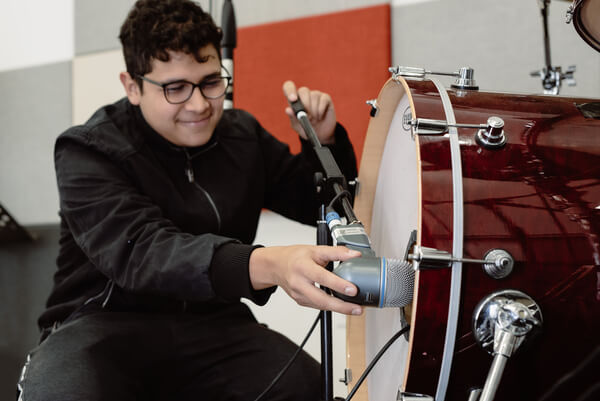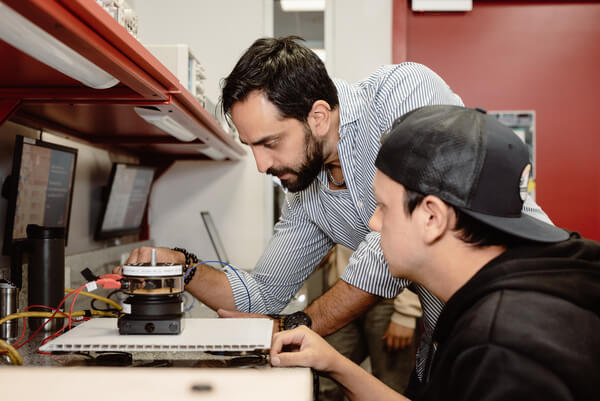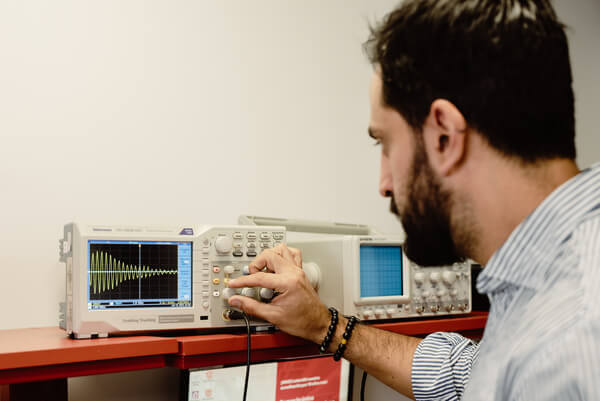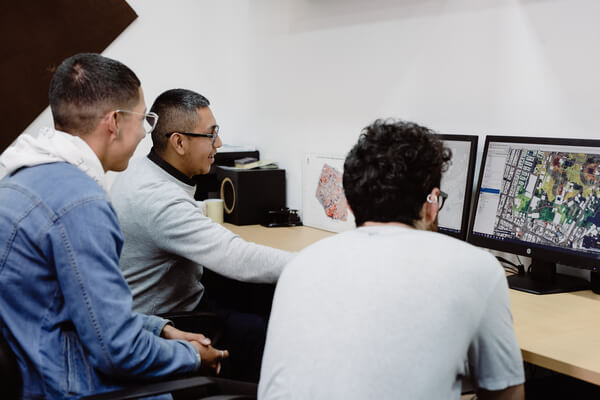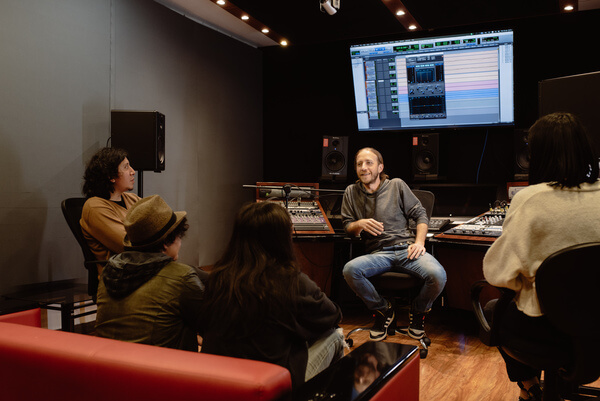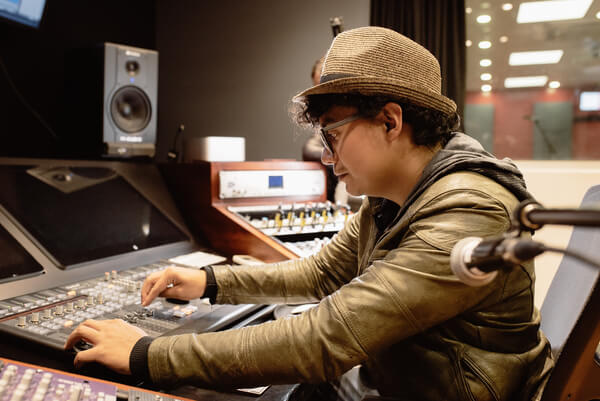Title : Bachelor in Sound and Acoustics Engineering.
Duration: 9 semesters
Modality: On site.
** The curriculum may be subject to changes.
The program is aimed at training competent engineers in the fields of Acoustics and Sound. The academic curriculum combines physics, mathematics, music, and extensive knowledge in sound and acoustics.
The Sound and Acoustics Engineer designs and implements solutions focused on electroacoustic systems, as well as audibly healthy and comfortable spaces. They utilize technological resources such as recording, sound reinforcement, acoustic instrumentation, simulation tools, and programming. They manage projects in acoustic and sound engineering, addressing stages of planning, operation, and evaluation through several types of research to optimize products, services, or processes. They work autonomously in multidisciplinary teams with a capacity for innovation, entrepreneurship, and effective communication.
- You will study a innovative career, unique in the country, with state-of-the-art technological resources. You will acquire knowledge in analog and digital audio recording using top-of-the-line equipment.
- This Engineering program will provide you with multidisciplinary knowledge applicable to fields such as Architecture, Mechanical Engineering, Civil Engineering, Environmental Engineering, and Electronic Engineering. You will develop expertise in the musical domain, understanding the science and art of sound.
- You will conduct relevant research and projects for the country’s benefit and the community. Several of these projects have been presented at international conferences. You will be equipped with entrepreneurial skills, allowing you to reach managerial positions or become owners of prestigious companies in the industry.
- The program is an AVID LEARNING PARTNER, which grants us access to first-hand software with the latest technology. We are always guided and supported by the creators of these programs.
- We are members of AES (Audio Engineering Society), and through this affiliation, we promote the AES UDLA chapter, which provides us with the opportunity to attend talks with international peers who are leaders in the world of audio.
- You will be a professional who develops creative solutions in the design of innovative technologies that improve industrial processes, environmental quality management systems and occupational safety. You will be able to apply methodologies for the development of environments that provide auditory comfort. In addition, you will be able to implement noise control management systems, providing support to construction sciences. You will have the ability to design and manage sound reinforcement systems, methodologies for sound capture in analog and digital media, and music production in general.
- Identifies, formulates, and solves complex engineering problems through the application of engineering principles, science and mathematics.
- Applies engineering design to produce solutions that meet specific needs considering the domains of public health, safety, and welfare, as well as global, cultural, social, environmental, and economic factors.
- Communicates effectively to a wide range of discipline-specific audiences.
- Recognizes ethical and professional responsibilities in engineering situations and makes informed judgments, which must consider the impact of engineering solutions in global, economic, environmental, and social contexts.
- Works effectively in a team whose members, together, exercise leadership, create a collaborative and inclusive environment, set goals, plan tasks, and accomplish objectives.
- Develops and conducts appropriate experiments, analyzes, and interprets data, and uses engineering judgment to draw conclusions.
- Acquires and applies new knowledge as needed, using appropriate learning strategies.
Graduates of the Sound and Acoustics degree can work as:
- Acoustical Consultant/Auditor
- Environmental noise manager
- Coordinator of environmental acoustics in the public sector (ministry and / or municipalities)
- Sound engineer for media, audio post-production for audiovisual media, recording, mixing, studio mastering, audio for video games, live recording, live sound, system design for entertainment, design of constant voltage systems (home automation).
- Music producer
- Live sound recording
- Researcher: in projects linked to improvements in society.
- Creation of technological instruments for the area of sound and acoustics that are not only used in the professional field of the two areas, but also in the medical field and in sustainable energy development.
- Creative applications
The Sound and Acoustics Engineer from the University of the Americas is a competent, entrepreneurial, and globally minded professional. They are committed to social well-being, aware of their cultural identity, and maintain a critical stance towards national and international realities.
The graduate can identify, formulating, and solving complex problems by applying engineering, science, and mathematical principles. They apply sound and acoustics engineering design to produce solutions that meet specific needs, considering public health, safety, and well-being, as well as global, cultural, social, environmental, and economic factors. Furthermore, they effectively communicate to a wide range of audiences within the discipline. They also recognize ethical and professional responsibilities in engineering situations and make informed judgments, considering the impact of engineering solutions in global, economic, environmental, and social contexts. Similarly, they work effectively in a team where members collectively exercise leadership, create a collaborative and inclusive environment, establish, and fulfill objectives, and plan tasks. Additionally, they develop and conduct experiments, analyze and interpret data, and use engineering judgment to draw conclusions. Finally, they acquire and apply new knowledge as necessary, using appropriate learning strategies.
The Sound and Acoustics Engineer is expected to act with ethical values for the benefit of society and the environment, respecting the current legal framework and being committed to the country’s development. They contribute to research projects to optimize products, services, or processes through autonomous work or in multidisciplinary teams with a capacity for innovation, entrepreneurship, and effective communication.
- Strengthen comprehensive skills and adapt to technological changes throughout life through continuous training and updating.
- Add value to organizations by practicing the profession with ethical values and principles.
- Design and implement effective solutions to societal problems using the tools of Sound and Acoustics Engineering, while being committed to the environment.
- Proactively participate in multidisciplinary teams that add value to products or services through innovation and the development of audio and acoustics tools.
A graduate of the Industrial Engineering program will be able to:
- Identify, formulate, and solve complex engineering problems by applying principles of engineering, science, and mathematics.
- Apply engineering design to produce solutions that meet specified needs taking into consideration public health, safety, and welfare, as well as global, cultural, social, environmental, and economic factors.
- Communicate effectively with a range of audiences within the field.
- Recognize ethical and professional responsibilities in engineering situations and make informed judgments, which must consider the impact of engineering solutions in global, economic, environmental, and societal contexts.
- Function effectively on a team whose members together provide leadership, create a collaborative and inclusive environment, establish goals, plan tasks, and meet objectives.
- Develop and conduct appropriate experimentation, analyze, and interpret data, and use engineering judgment to draw conclusions.
- Acquire and apply new knowledge as needed, using appropriate learning strategies.
Denominación | Nombre |
Decano de la facultad o su delegado | Diego Buenaño |
Máxima autoridad de la carrera o su delegado | Christiam Garzón |
Docente responsable de seguimiento a graduados | José Antonio Álvarez |
Representantes de los empleadores y/o representantes de gremios o asociaciones profesionales (lista tentativa) | Guillermo Suarez |
Daniel Cueva | |
Víctor Herrera | |
Byron Ojeda | |
Graduados | Diego Vásquez |
Sebastián Viteri | |
Jhonatan López | |
David Tornay |
Bachelor
| Academic Year | 2018 | 2019 | 2020 | 2021 | 2022 |
| Number of Students | 186 | 169 | 146 | 117 | 106 |
Bachelor Degrees Awarded
| Academic Year | 2018 | 2019 | 2020 | 2021 | 2022 |
| Number of Students | 49 | 32 | 29 | 16 | 25 |
If you are enrolled in another university, you can have your courses recognized through our simulator and study at UDLA.
Apply here
